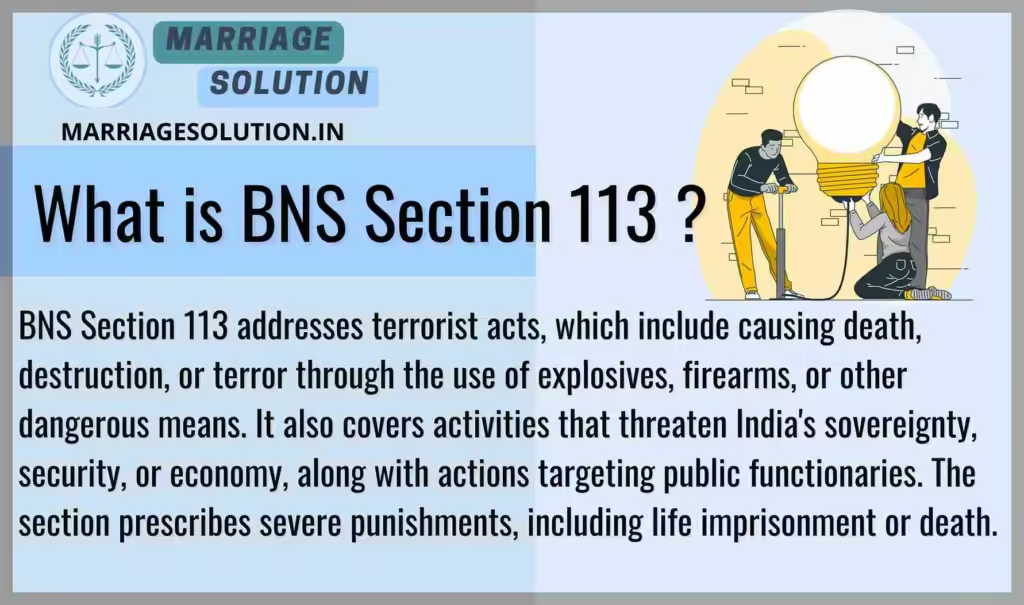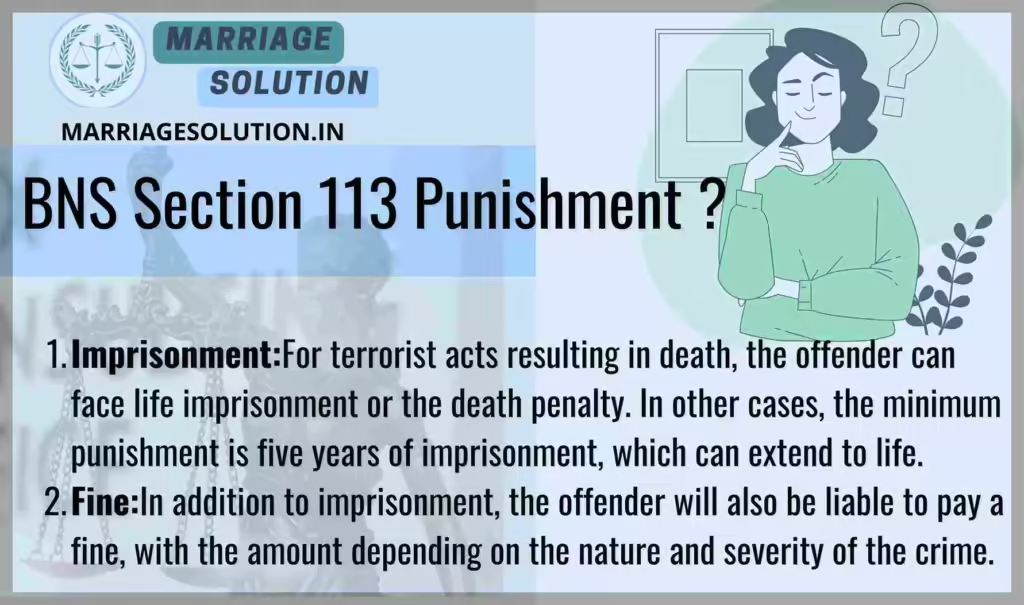Introduction of Section 113 BNS
BNS 113 deals with terrorist acts that threaten India’s unity, sovereignty, and security. It covers violence using explosives, firearms, hazardous substances, counterfeit currency, or cyber methods to cause death, destruction, or panic. The law prescribes life imprisonment or the death penalty, reflecting India’s strict stance against terrorism

What is BNS Section 113 ?
BNS Section 113 addresses terrorist acts, which include causing death, destruction, or terror through the use of explosives, firearms, or other dangerous means. It also covers activities that threaten India’s sovereignty, security, or economy, along with actions targeting public functionaries. The section prescribes severe punishments, including life imprisonment or death.
BNS Act – BNS Section 113
Whoever commits a terrorist act, with intent to threaten the unity, integrity, sovereignty, security, or economic stability of India, or with intent to strike terror in people, using bombs, firearms, hazardous substances, counterfeit currency, or other dangerous means, shall be punished with death, or imprisonment for life, and shall also be liable to fine.
If the act does not result in death, the punishment shall not be less than five years, but may extend to imprisonment for life, along with fine.
1. Definition of Terrorist Act
This section defines terrorism as any act intended to spread fear, threaten national security, or harm India’s unity and sovereignty. Such acts often involve explosives, firearms, biological/chemical/nuclear substances, or counterfeit currency.
Example: Planting a bomb in a crowded market to create mass panic.
2. Terrorism Resulting in Death
If a terrorist act causes the death of one or more people, the punishment is the death penalty or life imprisonment, along with a heavy fine. This reflects the law’s zero tolerance for acts leading to loss of life.
Example: A coordinated terror attack on a railway station killing civilians.
3. Terrorism Without Causing Death
Even if no death occurs, the law still prescribes strict punishment: a minimum of 5 years imprisonment, extendable to life, plus fine. This ensures that failed attempts or non-lethal acts (like bomb hoaxes or sabotage) are still severely punished.
Example: Circulating fake Indian currency to destabilize the economy.
4. Targeting Public Officials and Institutions
The section also applies when terrorists target government officials, the military, or public functionaries. Attacks on such figures are considered aggravated terrorism.
Example: Attempting to assassinate a judge or senior police officer.
5. Support and Facilitation of Terrorism
Not only direct acts, but abetting, financing, or harboring terrorists also falls under this section. Even property derived from terrorism is punishable.
Example: Providing shelter to a terrorist or funding a terror network.
6. Legal Nature of the Offense
- Cognizable → Police can arrest without a warrant.
- Non-Bailable → Bail is not easily granted.
- Non-Compoundable → Cannot be settled outside court.
- Trial → Tried in the Court of Session due to its seriousness.
Why This BNS Act Matters
Section 113 BNS is crucial for India’s national security. It ensures that terrorism, in any form—violent attack, economic sabotage, or organized facilitation—is punished with the highest severity. It protects citizens, government institutions, and the country’s unity.
Section 113 BNS Overview
BNS Section 113 defines a “terrorist act” as any action done with the intent to cause harm or fear that threatens India’s security. This could involve using bombs, firearms, or other dangerous materials to cause death, destruction, or disruption of essential services. It also includes acts targeting public officials, damaging important properties, or compromising the country’s monetary system by circulating counterfeit currency. This section aims to protect the nation from violent, dangerous, or organized crimes that undermine its security.
Section 113 BNS Overview
- Definition of Terrorism:
BNS Section 113 defines terrorism as actions intended to strike fear or harm the unity and security of India, often involving lethal weapons, explosives, or hazardous substances. - Targeting People and Property:
Terrorist acts include causing death or injury to people or damaging important public and private property, including government assets. - Impact on National Security:
Any action that disrupts essential services, such as energy supply, transport, or financial stability, is classified as a terrorist act if done to harm India’s security. - Counterfeit Currency:
Producing, smuggling, or circulating fake Indian currency to destabilize the economy is considered an act of terrorism under this section. - Attacks on Public Functionaries:
Acts targeting government officials, military personnel, or other key figures in India or abroad are also included under this section. - Recruitment and Training:
Organizing or participating in terrorist training camps or recruiting individuals for terrorist activities is punishable under Section 113. - Possession of Terrorist Property:
Possessing property obtained through terrorist activities is punishable with imprisonment, reflecting the seriousness of financial involvement in terrorism. - Harboring Terrorists:
Intentionally hiding or helping a terrorist, except for a spouse of the accused, leads to severe punishment under this section. - Punishments Based on Harm:
The punishment for terrorism depends on the extent of harm caused. If it results in death, the punishment can be life imprisonment or the death penalty. - Decision by Authorities:
Senior police officers (Superintendent rank and above) are responsible for determining if a case falls under this section or the Unlawful Activities (Prevention) Act, 1967.
Examples of BNS Section 113
- Example 1:
A group of individuals plants explosives at a railway station, causing death and damage to public property. Their intent was to disrupt essential services and create panic among the public. Under BNS Section 113, these individuals would be charged with a terrorist act, facing life imprisonment or even the death penalty for their actions. - Example 2:
A person circulates counterfeit Indian currency with the intent to destabilize the country’s economy. This act is considered a terrorist offense under BNS Section 113, as it threatens the economic security of India. The offender could face imprisonment for life and a hefty fine.
BNS 113 Punishment
Imprisonment:
For terrorist acts resulting in death, the offender can face life imprisonment or the death penalty. In other cases, the minimum punishment is five years of imprisonment, which can extend to life.
Fine:
In addition to imprisonment, the offender will also be liable to pay a fine, with the amount depending on the nature and severity of the crime.

BNS 113 bailable or not ?
BNS Section 113 offenses are non-bailable, meaning that the accused cannot easily secure bail. Bail can only be granted under exceptional circumstances as determined by the court.
Bharatiya Nyaya Sanhita Section 113
| Section | Offense | Punishment | Cognizable | Bailable? | Court |
|---|---|---|---|---|---|
| 113(1) | Terrorist act causing death or injury | Death or life imprisonment + fine | Yes | No | Court of Session |
| 113(2) | Terrorist act not resulting in death | 5 years – life imprisonment + fine | Yes | No | Court of Session |
| 113(3) | Conspiracy, abetment, facilitation | 5 years – life imprisonment + fine | Yes | No | Court of Session |
| 113(4) | Organizing terrorist training camps | 5 years – life imprisonment + fine | Yes | No | Court of Session |
| 113(5) | Membership of a terrorist organization | Imprisonment up to life | Yes | No | Court of Session |
| 113(6) | Harboring terrorists (except spouse) | 3 years – life imprisonment + fine | Yes | No | Court of Session |
| 113(7) | Possessing property from terrorism | Up to life imprisonment + fine | Yes | No | Court of Session |
Comparison Table BNS 113 vs IPC 16/UA(P)A Act.
| Law / Section | Scope | Punishment | Key Difference |
|---|---|---|---|
| IPC (before 2023) | Scattered provisions, no direct definition of terrorism | Up to life imprisonment | Lacked clarity, indirect coverage |
| UAPA, 1967 | Special anti-terror law, covers banned orgs, financing, foreign links | Life imprisonment or death penalty | Exclusive anti-terror law, outside IPC |
| BNS Section 113 | Defines terrorism in main criminal code, includes violence, counterfeit currency, facilitation | 5 years – life or death penalty + fine | Integrated approach within BNS |
BNS Section 113 FAQs
What is considered a terrorist act under BNS Section 113?
A terrorist act includes actions aimed at harming India’s security, using bombs, explosives, firearms, or other dangerous methods to create fear or damage property and life.
What happens if a terrorist act leads to someone’s death?
The punishment is either the death penalty or life imprisonment, along with a fine.
What if the terrorist act does not cause death?
In such cases, the offender can be imprisoned for a minimum of 5 years, which can extend to life imprisonment, along with a fine.
Is recruiting people for terrorist activities punishable?
Yes, recruiting or organizing terrorist training camps can result in imprisonment for at least 5 years, extendable to life, along with fines.
Who decides whether a case should be tried under BNS Section 113 or another law?
A senior police officer, not below the rank of Superintendent of Police, will decide if a case should be registered under this section or under the Unlawful Activities (Prevention) Act, 1967.
Need Legal Support?
If you’re facing court proceedings, marriage-related issues, or any legal matter, our team at Marriage Solution – Lawyer Help is ready to guide you. Just complete our easy online enquiry form, and we’ll connect you with the right legal assistance tailored to your needs.
Conclusion
BNS Section 113 is one of the strongest provisions in Indian criminal law, designed to counter terrorism in all its forms. It punishes not only the direct perpetrators but also those who assist, abet, or finance terrorism. By prescribing penalties ranging from a minimum of 5 years to life imprisonment or death, this section ensures that terrorism, whether through violence, counterfeit currency, or disruption of essential services, is dealt with uncompromising severity. The provision strengthens India’s national security framework and protects citizens from threats to peace and stability.
Finished with BNS 113 ? Continue exploring the next provisions of the Bharatiya Nyaya Sanhita (BNS), 2023. Each section includes explanations, examples, and plain-language breakdowns for easy understanding.
- Section 114 BNS : Hurt .
- https://marriagesolution.in/bns_section/section-114-bns/
- BNS 115 : Voluntarily causing hurt .
- https://marriagesolution.in/bns_section/bns-115/
- BNS 116 : Grievous hurt
- https://marriagesolution.in/bns_section/bns-116/
- BNS 117 : Voluntarily causing grievous hurt .
- https://marriagesolution.in/bns_section/bns-117/
- BNS Section 118 : Voluntarily causing hurt or grievous hurt by dangerous weapons or means.
- https://marriagesolution.in/bns_section/bns-section-118/
Full IPC Section List: https://marriagesolution.in/ipc-section-list
All Indian Law & Blogs: https://marriagesolution.in/indian-law/
Full BNSS Section List: https://marriagesolution.in/bnss_section-list
